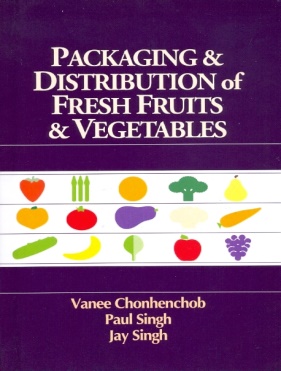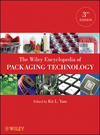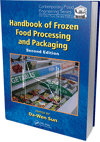The produce aisle delivers fresh packaging
Packaging of produce optimizes convenience and freshness.
 To view this article in the digital edition, Click
Here and turn to page 25.
To view this article in the digital edition, Click
Here and turn to page 25.
Packaging achieves food safety and convenience with all types of food, including produce. While not all fruit and vegetables require packaging, more options are sprouting in the produce aisle as consumers stress the importance of convenience and portability.
Baltimore Innovations’ (www.baltimoreinnovations.co.uk) launch of the Fresh-R-Pax “Fruit-Pop” pouch is pioneering the way for sliced fresh fruit becoming a portable option. The “Fruit-Pop” pouches are made with food-safe absorbent technology that allows processors to pack ripe fruit. The new packs are easy to open, tamper evident and offer extended shelf life relative to other alternatives in the market.
“Customers have been asking us to develop a way of packing fresh cut fruit into single-serve portions, with extended shelf life. At the same time they’ve asked us to keep the solution economically attractive. We’ve been working on this new Fruit-Pop pack for a few years, and we’re now happy that it ticks all three boxes,” says Matthew Valentine, Managing Director, Baltimore Innovations.
But it’s not just convenience that urges packagers to package produce, the innovative packaging actually helps to extend the shelf life and in some cases addresses sustainability concerns.
UK retailer Sainsbury’s enlisted the help of Amcor Flexibles (www.amcor.com) to create an innovative new packaging format for its fresh produce that would create a customer experience. Amcor Flexibles Fresh Produce’s UK-based team worked closely with Sainsbury’s selected customer base, machinery manufacturers and film suppliers in order to develop a unique combination of flexible surface printed film and net, which would run on existing film packing lines.
The netted bags can be found on the company’s British apples, pears, potatoes and onions. The netted bags allow consumers to see the different shapes and colors and to touch and smell the fresh aromas of the produce inside.
But also, the produce bag served another purpose, extending the life on the produce inside. According to Sainsbury’s website, apples, potatoes, bananas and oranges are the top fruits thrown out whole due to spoilage. Knowing that nearly all fruits and vegetables will keep fresher for longer when refrigerated in a plastic or paper bag, the company created its produce packaging to help address this concern.
Fruit and vegetables are a must for proper nutrition so it’s nice to see packagers ensure that produce packaging not only protects the contents, but also makes getting our “5 (servings) A Day” easier.
SIDEBAR:
Fruit clamshells protect
Clamshells packaging for produce offers protection and visibility. Highland Packaging Solutions uses OCTAL’s (www.octal.com) DPET™ sheet and then thermoforms the clamshell containers for produce growers to load their fruit into. OCTAL’s DPET process is more energy efficient and has the lowest carbon footprint than any PET on the market.
According to Steve Maxwell, CEO of Highland Packaging Solutions (http://highcor.com), “Our core business is produce packaging, and in that world runnability and consistency are crucial to customer satisfaction and packing house efficiencies. At Highland we rely on Octal for the critical segments of our business that demand excellence.”
The quality consistency gives the clamshells easy open and close functionality, visibility and sturdiness that protects the produce.

Packaging achieves food safety and convenience with all types of food, including produce. While not all fruit and vegetables require packaging, more options are sprouting in the produce aisle as consumers stress the importance of convenience and portability.
Baltimore Innovations’ (www.baltimoreinnovations.co.uk) launch of the Fresh-R-Pax “Fruit-Pop” pouch is pioneering the way for sliced fresh fruit becoming a portable option. The “Fruit-Pop” pouches are made with food-safe absorbent technology that allows processors to pack ripe fruit. The new packs are easy to open, tamper evident and offer extended shelf life relative to other alternatives in the market.
“Customers have been asking us to develop a way of packing fresh cut fruit into single-serve portions, with extended shelf life. At the same time they’ve asked us to keep the solution economically attractive. We’ve been working on this new Fruit-Pop pack for a few years, and we’re now happy that it ticks all three boxes,” says Matthew Valentine, Managing Director, Baltimore Innovations.
But it’s not just convenience that urges packagers to package produce, the innovative packaging actually helps to extend the shelf life and in some cases addresses sustainability concerns.
UK retailer Sainsbury’s enlisted the help of Amcor Flexibles (www.amcor.com) to create an innovative new packaging format for its fresh produce that would create a customer experience. Amcor Flexibles Fresh Produce’s UK-based team worked closely with Sainsbury’s selected customer base, machinery manufacturers and film suppliers in order to develop a unique combination of flexible surface printed film and net, which would run on existing film packing lines.
The netted bags can be found on the company’s British apples, pears, potatoes and onions. The netted bags allow consumers to see the different shapes and colors and to touch and smell the fresh aromas of the produce inside.
But also, the produce bag served another purpose, extending the life on the produce inside. According to Sainsbury’s website, apples, potatoes, bananas and oranges are the top fruits thrown out whole due to spoilage. Knowing that nearly all fruits and vegetables will keep fresher for longer when refrigerated in a plastic or paper bag, the company created its produce packaging to help address this concern.
Fruit and vegetables are a must for proper nutrition so it’s nice to see packagers ensure that produce packaging not only protects the contents, but also makes getting our “5 (servings) A Day” easier.
SIDEBAR:
Fruit clamshells protect
Clamshells packaging for produce offers protection and visibility. Highland Packaging Solutions uses OCTAL’s (www.octal.com) DPET™ sheet and then thermoforms the clamshell containers for produce growers to load their fruit into. OCTAL’s DPET process is more energy efficient and has the lowest carbon footprint than any PET on the market.
According to Steve Maxwell, CEO of Highland Packaging Solutions (http://highcor.com), “Our core business is produce packaging, and in that world runnability and consistency are crucial to customer satisfaction and packing house efficiencies. At Highland we rely on Octal for the critical segments of our business that demand excellence.”
The quality consistency gives the clamshells easy open and close functionality, visibility and sturdiness that protects the produce.
Looking for a reprint of this article?
From high-res PDFs to custom plaques, order your copy today!










